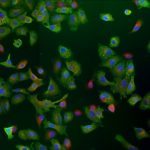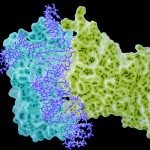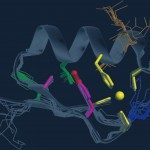Link to Pubmed [PMID] – 35278581
Link to DOI – 10.1016/j.antiviral.2022.105272S0166-3542(22)00040-7
Antiviral Res 2022 May; 201(): 105272
Effective drugs against SARS-CoV-2 are urgently needed to treat severe cases of infection and for prophylactic use. The main viral protease (nsp5 or 3CLpro) represents an attractive and possibly broad-spectrum target for drug development as it is essential to the virus life cycle and highly conserved among betacoronaviruses. Sensitive and efficient high-throughput screening methods are key for drug discovery. Here we report the development of a gain-of-signal, highly sensitive cell-based luciferase assay to monitor SARS-CoV-2 nsp5 activity and show that it is suitable for the screening of compounds in a 384-well format. A benefit of miniaturisation and automation is that screening can be performed in parallel on a wild-type and a catalytically inactive nsp5, which improves the selectivity of the assay. We performed molecular docking-based screening on a set of 14,468 compounds from an in-house chemical database, selected 359 candidate nsp5 inhibitors and tested them experimentally. We identified two molecules which show anti-nsp5 activity, both in our cell-based assay and in vitro on purified nsp5 protein, and inhibit SARS-CoV-2 replication in A549-ACE2 cells with EC50 values in the 4-8 μM range. The here described high-throughput-compatible assay will allow the screening of large-scale compound libraries for SARS-CoV-2 nsp5 inhibitors. Moreover, we provide evidence that this assay can be adapted to other coronaviruses and viruses which rely on a viral protease.












